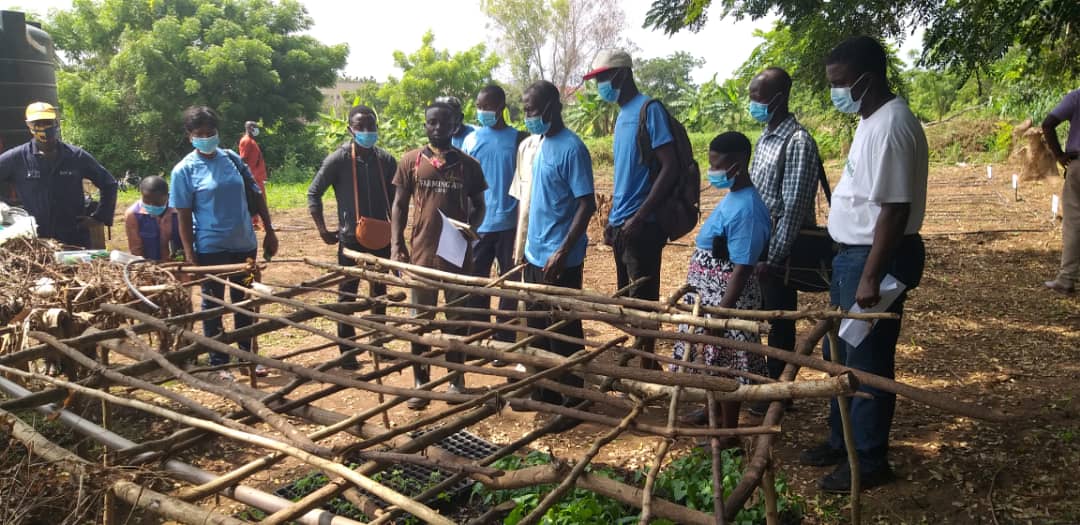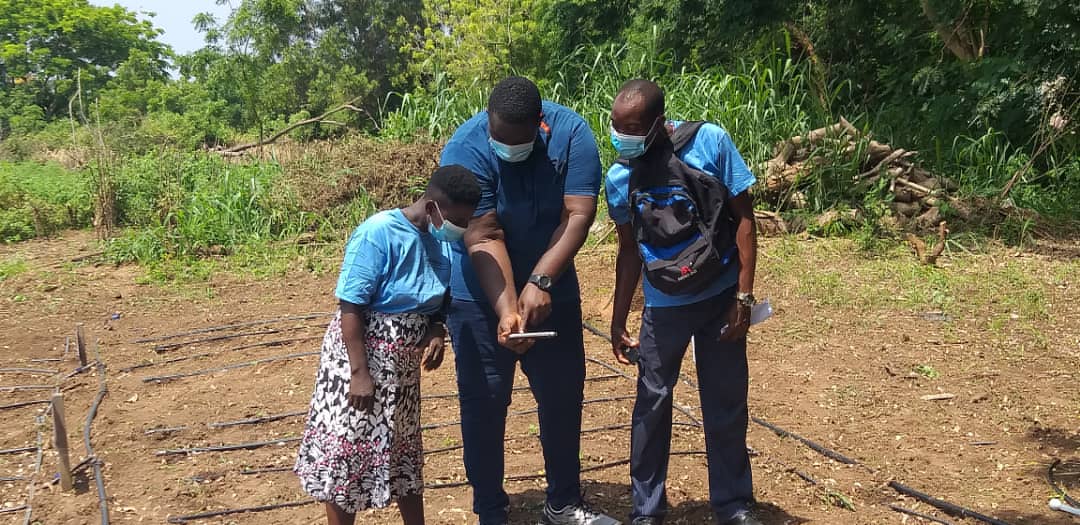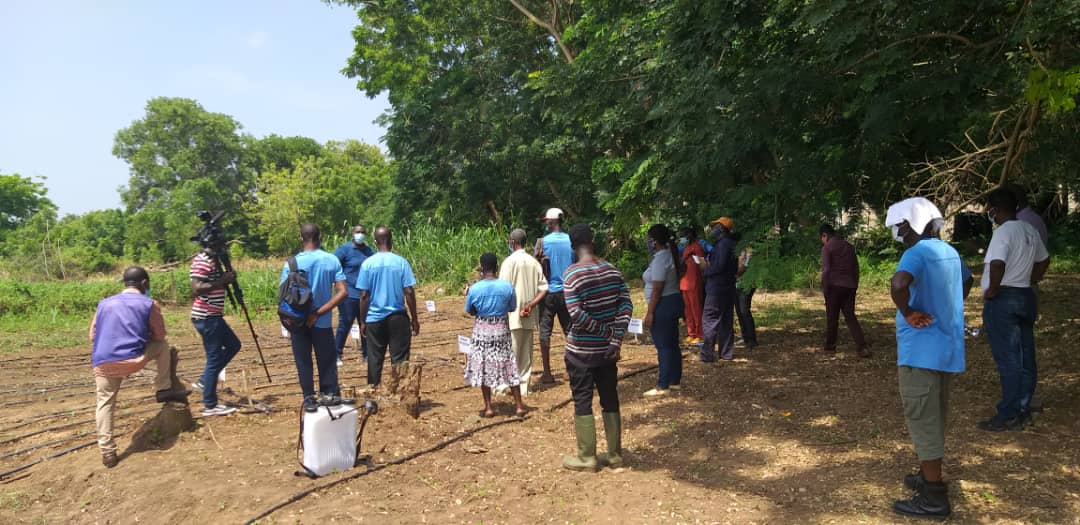
The Institute of Industrial Research (IIR) of the Council for Scientific and Industrial Research (CSIR) has held an Open Day as part of its stakeholder engagements planned for Work Package 3 of the RECIRCUALTE project which is currently underway.
The event held under the topic, ‘Water for Food Production’ was used as an advocacy tool and engagement strategy to raise awareness of the RECIRCULATE project and its activities in the development, transfer, and utilization of the research findings and also to exchange knowledge with farmers to explore the commercial potential of irrigation scheduling which sought to address shortfalls in water availability for crop production within the context of national development.

The core objectives of the selected topic ‘Water for Food Production’ which is Work Package 3 under the RECIRCULATE project are to identify what approaches to water-efficient irrigation are most appropriate for the cultivation of fresh produce, given the water resource available.
It is also to investigate how efficient techniques can be developed and optimized for farmer communities which will require an understanding of the socio-economic barriers to the adoption of water-saving irrigation techniques in selected communities.
The event was in two parts, the first session consisted of the opening and the second part being a field trip to the project site where experimental field trials on the various irrigation scheduling techniques are conducted to compare the growth, yield and water productivity response of tomato plants subjected to thermal imaging (plant sensing) Penman-Monteith (meteorology), tensiometer (soil sensing) and grower intuition methods of irrigation scheduling.
In his welcome address, Mr. Joseph Yaw Amoah, Deputy Director, CSIR-IIR who chaired the event welcomed farmers from the three selected communities in the Central Region of Ghana namely Gomoa Okyereko, Baifikrom and Mankesim as well as other key stakeholders in the Agri-Food Chain to the Institute and to the event.
Mr. Amoah re-emphasised CSIR’s commitment to solving problems through research to facilitate national development.

Mr. Joseph Yaw Amoah gave a brief overview of the Open Day and underscored why it is important for the Institute to open its doors to the general public.
He further explained that it is important for stakeholders to know more about CSIR so they tap into CSIR’s expertise.
“This Open Day, therefore, serves as a frontier for you to learn at first-hand through interaction”, he added.
He acknowledged organisations which collaborated with the Institute and even those who helped the Institute to get data to enrich its field research. He also said that the occasion was an opportunity for self-examination in order to put the Institute on its toes and drive to a better new direction.
Dr. William Owusu Oduro, CSIR-IIR who is the coordinator for the Work Package 3 of the RECIRCULATE project, shed more light on the project with special emphasis of the various Work Packages and their relevance to human sustenance and development.
He remarked that the project seeks to help minimize waste and to maximize the benefits derived from natural resources and the environment as a whole.
The second session which lasted for almost two hours was mainly devoted to the technical activities, knowledge sharing and interactions where scientific research findings met local knowledge and experience. The session was led by Mr. Gilbert Osei who is a versatile researcher with interest in deficit irrigation, drip irrigation, pitcher irrigation and irrigation water quality.

He holds a first degree in General Agriculture and an MPhil degree in Irrigation technology. He is currently a doctoral fellow at the Department of Agricultural Engineering, University of Cape Coast, Ghana pursuing a PhD in Irrigation technology and Management.
In his closing remarks, the Chairman said that “it is about time Ghanaians tap into the technologies and research findings from research communities like the CSIR”. This I believe will be an impetus for national development, he remarked.
He urged participants to remain committed to the knowledge impacted in order to be successful in their various endeavours.
Mr. Amoah mentioned that though there are challenges within the agribusiness sector especially with access to funding opportunities and patronizing research outputs and technologies, he advised farmers and other participants to form business networks and take advantage of government flagship initiatives like the One District One Factory (1D1F) and the Planting for Food and Jobs. These have the ability to improve your lot, he told participants.
About the Recirculate Project
RECIRCULATE is a major project with a clear research focus on building and utilizing circular water economy which also aims at supporting new partnership-based approaches to enable African researchers and research institutions to grow transformational impact through working with, in and for communities.
It is envisaged that these partnerships will be robust, durable and equitable. The output of phase 1 of the RECIRCULATE project is expected to be applied in Botswana, Zambia, Namibia and other countries within the African sub-region.
The 4-year project which is currently running in Ghana and funded by the Research Councils, UK through the Global Challenges Research Fund (GCRF) has the stated aim of growing research capability to meet the challenges faced by developing countries.
The Project is founded on research and training being delivered both in the UK and with our three Phase 1 partners (involved from the beginning of the project) in Africa (University of Benin (UniBen), Nigeria; Council for Scientific and Industrial Research (CSIR) in Ghana, and Lancaster’s Ghana campus (LU Ghana)), with reciprocal exchange of researchers from these organisations and later with our Phase 2 partners (involved in years 3 and 4) in Botswana (Botswana International University of Science and Technology), Kenya (African Technology Policy Studies (ATPS) Network), Malawi (National Commission for Science and Technology) and Zambia (The Copperbelt University). In this way, a key outcome of the project will be the creation of a strong, self-sustaining research and innovation community that will continue to deliver solutions to SDGs beyond the life of the project.
The project implementation process is divided into thematic areas which are termed Work Packages (WPs).
Work Package 1: Entrepreneurship and Innovation (Lancaster & LU Ghana): African scholars and policymakers have consistently argued for the need to develop strong local institutions to address the everyday struggles of poor citizens – the primary targets of SDGs. One element of “strong local institutions” is research organisations. Communities must, therefore, be the ultimate targets of the ‘smart solutions’ we aspire to develop in this proposal. The core research question for WP1 is what is the optimum “ecosystem” for African research institutions to work with, in and for their communities? Under this overall question, we will investigate (i) how to grow innovation capacity and entrepreneurial capabilities (entrepreneurial ecosystem) to shape the design, development and exploitation of high-quality science, technology, engineering and maths (STEM) research for sustainable development by delivering eco-innovative solutions; (ii) investigate who the key innovators and “change-makers” are in different African communities, (iii) whether models focusing on small to medium-sized enterprises (SMEs), successful in the UK, translate to an African context or are other/additional foci required? The co-creation of appropriate scalable programmes will contribute to international research into knowledge transfer and exchange and provide a platform for dissemination to improve community-research interactions.
Work Package 2: Water for sanitation and health (Lancaster and CSIR): The last two decades have seen much improvement to potable water supply to millions of urban people living in the informal settlements that characterise African urbanisation (UN Habitat 2014). Water is usually provided via standpipes shared by a group of households, but while this has improved availability of potable water to many unplanned settlements, the potential benefits are severely compromised by sewage contamination around the point of use where water is taken from the water pipe to the home- “the last 100 metres”. The risk of contamination is exacerbated because informal dwellers typically rely on toilets draining into poorly built pits or septic tanks, which often leak faecal material into the local environment. The resulting contamination of potable water and food causes high levels of ill-health and childhood malnourishment (Kau et al. 2011) and, in turn, individual and household poverty (Mitlin and Satterthwaite 2013). Improving local sanitary environments therefore directly addresses multiple SDGs. The core research questions for WP2 are (i) understanding how ‘the last 100metres’ problem manifests itself across a range of contexts (including those related to food and energy, see WPs 3&4) and (ii) identifying interventions (eco-innovations and/or changes to practice) that reduce contamination (see WP5) in the last 100 metres in those contexts. As well as extending understanding of “the last 100 metres” to West Africa, WP2 will draw on the learning from WP1 to work with the wider community (our Pillars 2&3) to develop business cases to roll-out successful interventions to improve sanitation and health for communities in Nigeria and Ghana.
Work Package 3: Water for food production (Lancaster and CSIR): Although many African countries have abundant water resources, much of the continent’s crop production is rain-fed with low yields that are vulnerable to climate extremes. Effective sustainable water management for African communities depends both on (i) access to safe, sustainable water sources (whether from ground or surface water, rain-water capture and storage or “re-cycled” water (linked to WPs 2 and 4) and (ii) irrigation that makes optimum use of those resources. Water-saving irrigation techniques, which Lancaster has played a major role in developing (Du et al., 2015), can greatly increase crop water use efficiency. Nevertheless, despite increasing interest in development projects to assist smallholder farmers (e.g. African Water Facility’s Upscaling Smallholder Irrigation project (AfDB, 2016), there is a major disconnect between the technological development of water-efficient techniques, and their adoption by smallholders (Burnham et al., 2015), The core research questions of this work-package are to (i) identify what approaches to water-efficient irrigation are most appropriate to cultivate fresh produce, given the water resources available to [small-holder] communities, including “harvested” and stored rain-water, and recycled water (e.g. digestate from anaerobic digestion – WP4); (ii) investigate how these techniques can be developed and optimized for such communities, and (iii) understand the socio-economic barriers to the adoption of water-saving irrigation techniques in particular communities, such as those revealed by our research in Nepal (Howell et al., 2015).
Work Package 4: Water for energy production (Lancaster and UniBEN): When waste materials (including human and animal waste, food waste and crop residues) are brought together in anaerobic digestion (AD) for energy (biogas) production the resulting waste product (“digestate”) has the potential to be used as a fertilizer within cropping systems (Riding et al., 2015). However, such use depends on effective pasteurisation to prevent transmission of human pathogens. Conventional pasteurisation technologies, widely employed in AD across the UK and Europe, require “high-grade energy” to raise feed slurries to the required temperature and so are extremely energy-intensive, increasing operating costs and reducing the net energy yield. This leads to the core research questions of this work package: (i) can digestate from anaerobic digestion be effectively pasteurised to respond to the pathogen challenges of West Africa (see WP5) by employing low thermal intensity processes coupled with the anaerobic digestion? (ii) what is the value of [pasteurized] digestate in irrigation and delivery of nutrient and soil conditioning values? (linked to WP3) and (iii) how can research results be used to develop and define good practice for its agricultural application taking account of attitudes to the use of “waste” in different communities?
Work Package 5: Water: pathogens and health (Lancaster, UniBEN and CSIR): As this project has developed with our West African partners, it became clear that microbial contamination of water was a shared challenge across all the work-packages. In response, we include a focussed integrating WP on the microbiology of the different elements of the water economy studies in WPs 2-4. The fundamental research objectives for WP5 are (i) to understand the presence, diversity and impact of human pathogens in different water sources and different uses linked to WP2-4; (ii) to work with partners to review their qualitative and quantification methods and compare them with a wider suite of methodologies (e.g. our partners mostly use bacterial markers of faecal contamination which may underestimate contamination by many other microbial pathogens), and (iii) use the data and understanding obtained, linked with that from other WPs, to propose and assess effective, affordable methodologies for use by our partners and more widely in Africa to sustain water quality and reduce the impact of disease particularly in children and other vulnerable members of communities.
Source: citinewsroom





